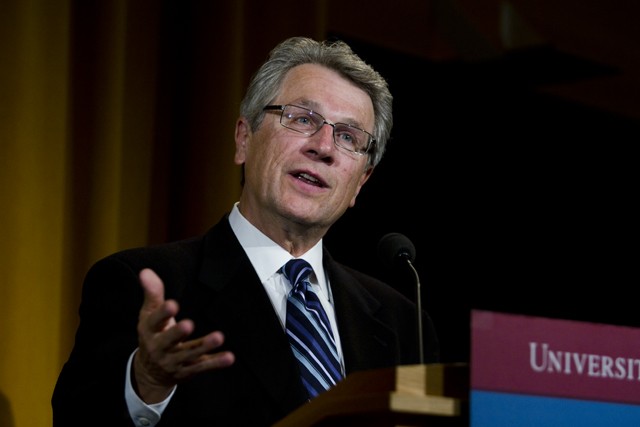Independence Party nominee Tom Horner said he hopes to maintain current levels of funding for the state’s higher education institutions, including the University of Minnesota, if elected governor.
Horner detailed his plans for all levels of education at a Monday candidate forum hosted by the University’s Center for the Study of Politics and Governance.
He stressed the role of postsecondary education in the state and the importance of making the University a premier research institution, along with reforms at the K-12 level.
“We’re reaching the point … where more cuts are going to hurt the quality [of higher education],” Horner said. “They’re going to hurt the ability of the University, for example, to be a world-class research University.”
Minnesota’s higher education system should be centered around a world-class research institution, he said, referring to the University.
Horner would allocate $30 million in new funding for research at Minnesota’s colleges and universities, according to a job creation plan released Friday. Stressing a “cradle to grave” approach, he would also put $120 million toward early childhood, K-12 and higher education.
Horner specifically discussed his support for post-graduate studies and for the University’s biomedical and science-based programs.
“This is a big valentine to the University,” Larry Jacobs, the event’s moderator, said.
Money to pay for the additional funding would come from new revenue — which includes an expansion of the state’s sales tax — and spending cuts elsewhere in the budget, Horner campaign spokesman Matt Lewis said.
Horner also discussed the role of the state’s two-year colleges during the forum. More emphasis should be put on matching curriculum to local businesses and making it easier for students to transfer to a four-year institution, he said.
A new governor, University president and Minnesota State Colleges and University system chancellor could mean significant changes to higher education in Minnesota, Horner said.
At the K-12 level, he proposed giving teachers more autonomy when determining their curriculum and lesson plans. He would also support more technology in the classroom.
But Horner didn’t explain how teachers, if given more authority, would be held accountable for their classes, Jacobs noted.
Ted Kolderie, a senior associate at Education Evolving, a public policy group, said he appreciated Horner’s message of reform at the K-12 level.
“There’s got to be a process of innovation that runs alongside the process of continuing improvement in existing schools,” he said.
Throughout the forum, Horner stressed his centrism and the need for collaboration in this polarized political climate.
But Horner’s proposals are moot if he can’t gather the support to attain the governor’s seat and pass legislation. Although he expects to combine ideas from both Republicans and Democrats, Horner could end up facing “bipartisan resistance,” Jacobs said.
“Where’s the evidence that he’s got the track record of creating the kind of enormous political change we’re going to need in Minnesota to pursue his agenda?” Jacobs asked. “It may sound better than it actually is.”
Horner’s was the last of three gubernatorial forums at the Humphrey Institute of Public Affairs.

Image by Mark Vancleave
Independence Party gubernatorial candidate Tom Horner speaks about his bipartisan abilities and plans for education reform Monday at the Humphrey Center.
Horner gets specific on ed. plan
He hopes to maintain the current levels of funding.
by James Nord
Published September 21, 2010
0
More to Discover







